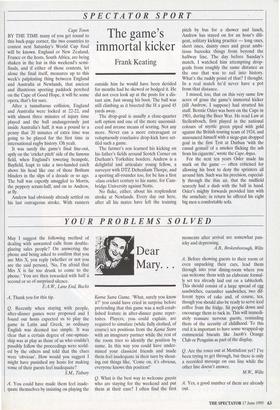SPECTATOR SPORT
The game's immortal kicker
Frank Keating
Cape Town BY THE TIME many of you get round to this back-page corner, the two countries to contest next Saturday's World Cup final will be known. England or New Zealand, France or the hosts, South Africa, are being shaken in the hat in this weekend's semi- finals, and if either of those contests, let alone the final itself, measures up to this week's palpitating thing between England and Australia at Newlands, that ancient and illustrious sporting paddock perched on the Cape of Good Hope, it will be some opera, that's for sure.
After a tumultuous collision, England and Australia were locked at 22-22, and with almost three minutes of injury time played and the ball undangerously just inside Australia's half, it was a pound to a penny that 20 minutes of extra time was going to be played for the first time in international rugby history. Oh yeah.
It was surely the game's final line-out, aptly on the 'cricket pitch' side of the famous field, when England's towering beanpole, Bayfield, leapt to take a two-handed catch above his head like one of those Botham blinders in the slips of a decade or so ago. The ball was expertly smuggled to Morris, the peppery scrum-half, and on to Andrew, at fly.
Andrew had obviously already settled on his last outrageous stroke. With runners outside him he would have been derided for months had he skewed or bodged it. He did not even look up at the posts for a dis- tant aim. Just swung his boot. The ball was still climbing as it bisected the H a good 45 yards away.
The drop-goal is usually a close-quarter soft option and one of the more unconsid- ered and arcane means of scoring. Not any more. Never can a more extravagant or voluptuously conclusive drop-kick have set- tled such a game.
The farmer's son learned his kicking on his father's fields around Scotch Corner on Durham's Yorkshire borders. Andrew is a delightful and articulate young fellow, a surveyor with DTZ Debenham Thorpe, and a sporting all-rounder too, for he has a first -class cricket century to his name, for Cam- bridge University against Notts.
No fluke, either, about his resplendent stroke at Newlands. Every day out here, after all his mates have left the training pitch by bus for a shower and lunch, Andrew has stayed on for an hour's dili- gent, solitary kicking practice — long ones, short ones, dainty ones and great ambi- tious bazooka things from beyond the halfway line. The day before Sunday's match, I watched him attempting drop- goals from roughly the same distance as the one that was to sail into history. What's the ruddy point of that? I thought. In a real match he'd never have a pot from that distance.
I mused, too, that on this very same few acres of grass the game's immortal kicker (till Andrew, I suppose) had strutted his stuff. Bennie Osler was born on the Cape in 1901, during the Boer War. He read Law at Stellenbosch, first played in the national colours of myrtle green piped with gold against the British touring team of 1924, and announced himself with a siege-gun dropped goal in the first Test at Durban 'with the casual gesture 'of a smoker flicking the ash from his cigarette', wrote the Cape Argus.
For the next ten years Osler made his mark on the game — often criticised for allowing his boot to deny the sprinters all around him. Such was his precision, especial- ly through the thin air, that the midfield scarcely had a dash with the ball in hand. Osler's mighty forwards provided him with the armchair; in return he offered his eight big men a comfortable sofa.


































































 Previous page
Previous page